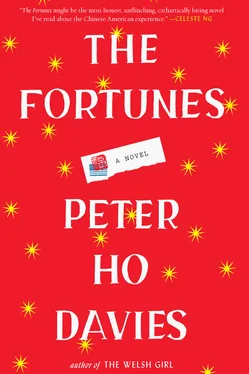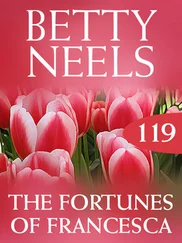He’d not been back to Chinatown since, but a few months later he’d spied a headline in the newspaper he was ironing for Crocker: “The Chinese Question.” As far as he could make out, it was an announcement for a meeting. He knew the place from his delivery rounds — a stockyard near the river. Something compelled him to go. He didn’t know the question and yet it felt asked of him personally. He might even speak, he imagined, show himself as an example, doffing his hat and bowing with a flourish. If there was a Chinese question, was he not perhaps the embodied answer?
His Western clothes, he concluded later, must have saved him, for by the time he understood what kind of a meeting he’d joined, he’d already insinuated himself far into the crowd, too far to exit swiftly. Or rather the crowd had congealed around him; when he’d arrived it had seemed looser, knots of Irish here, English there, French by their accents to one side, Deutsch by their build to another. There were no other Chinese, and he felt a flash of irritation that none had bothered to appear, vindicated that he had. Of course, he should have known by their absence, but he lingered in the vicinity of some Portugeezers (he recognized their language from the flower boat with a pang of nostalgia — sailors who’d jumped ship and turned miners, he guessed), and gradually the spaces between the groups had filled, the knots of men tautening, until leaving would have required him to draw attention, elbowing his way out of the mass, until finally the crowd closed tight as the speaker — a liverish redhead in a fustian jacket — climbed up onto a splintery buckboard and called out over the corral in his broad brogue.
“They’re a plague on us, a blight indeed! For have they not blighted our prospects, those of my Fenian brothers and our brave sisters of Erin? They take our jobs on the iron road and their jobs at the hob and hearth.” An answering buzz rose from the corral, along with the dusty stench of aged manure. “And how is it natural that they can do both a man’s and a woman’s work? What species of creature are they to upend the order of things? Cipher that if ye can. They work harder than us, some say. Oh, really? Who thinks they’re stronger ’an me?” He had shrugged his jacket off and pushed up his sleeves as he warmed to his theme. Now he flexed his arm mightily until the rolled cuff seemed to tighten on it like a tourniquet and the pale flesh swelled red. “So why are they hired? Because they work for less —less pay, less food, less dignity. And what does that make ’em? Less men! Lesser to be sure, but heed me, also more —in their poised and waiting millions, so many more. And I tell ye”—he jabbed a stubby finger at the crowd—“they won’t stop with me and mine. Nay! They’ll come for your work — Dutchman, Swede, native-born, yea, even you English — and your pay afore long. Can ye doubt it? Can ye afford it?” And the crowd bayed as one, some throwing their hats in the air so it seemed as if the roar had blown them off. To Ling it seemed the mass of men had come to a rolling boil.
“Exclusion!” the speaker was bawling, as if into a gale. “Exclusion by act of law, or expulsion by strength of arms!”
Ling felt himself crushed in the fist of the throng, his breath coming in shallow pants. He wormed a hand up between himself and his neighbor to keep his hat tugged tight to his head — to lose one would be to lose the other, he feared. He kept being thrust into the back of the sour-smelling fellow before him, his collar so wilted and greasy it seemed embroidered with filth. A man, he thought pityingly, who couldn’t even afford laundry — another to his left, one more to his right, men whose shirts he itched to boil — and then it came to him that they were boycotting the laundries. Only when the crowd dispersed, bumping and jostling him as they drained down the alleys toward the slough to smash windows and set fires, did he feel he could breathe again, as if he’d been held underwater. From behind, watching them go, all he could make out was the pallid skin of their napes in the gloaming, cleaner than their grimy linens.
8.
And all that was two years ago. Two years and eighty miles of track, Ling thought as the train pressed forward, engine thudding like a heart, as if into the future. By now ten thousand Chinese were working on Crocker’s “Celestial Railroad,” as the papers were calling it. And they owed it all to him (even if now, in line behind other Chinese, he’d learned to wait in silence as they struggled with the language, only making sure, when it was his turn, to speak as distinctly as possible).
It was as if, like the Monkey King, he’d plucked the very hairs from his head and created an army. Though he still sometimes imagined his queue attached, reached back instinctively to sweep it aside when he sat, waited for it to bump his back when he halted.
But now they were striking. Crocker had told him the news two days earlier, his face wrung tight with consternation. “Chinese don’t strike; they break strikes.” He stared at Ling, as if expecting him to contradict the provoking telegram in his fist, but Ling kept his eyes down. It came to him that he was the only Chinese Crocker knew, to the extent that he knew him at all. All those thousands were judged by his standard — not just the strength of his back but his loyalty. For he was loyal to Crocker. Not just because Crocker was his employer, his route to riches and a comfortable life, but out of pride. (He was proud; Ng had been right.) He had been proud that Crocker had backed him against his partners that day in the yard. That was why he held fast as they stacked him higher and higher with firewood. He’d been proud to prove himself better than the ghosts’ opinions, to prove the Chinese better than they thought. Proud that they should all be measured by his standard. Except now, before Crocker’s affronted gaze, the measure was reversed— he was being judged according to their worth.
He felt a momentary instinct to protect Crocker, as if his faith, his naive trust in the Chinese was in danger. Or perhaps he just didn’t want Crocker’s look of astonishment to become one of recrimination: You deceived me. And in turn he felt his own anger at the Chinese, for letting down not Crocker but himself, Ling. Ingrates, he thought, almost before he knew it.
How he yearned, then, to tell Crocker he was half white. He’d even imagined it: the look of perplexity, followed by one of gratified recognition, lighting up the big man’s face like a paper lantern. He never had, of course — out of shame, at first, about his sordid origins — but now it came to him that he never could, not after that day in the yard, for fear that Crocker would think he had gulled him, misrepresented himself as Chinese.
The train had paused to take on water. The shouts of the engineers as they went about their work seemed thin and distant compared to the deep throbbing of the engine itself. In the stillness, Crocker began to stir.
“Where are we?”
Ling eyed his map. “Colfax?”
Crocker nodded, pulled out his watch, big as a saucer, and studied it owlishly.
“Good time.” He looked at Ling. “You’ve been partaking of the scenery.”
“Yessir.” As if it were an order.
“Wait’ll you see this.” Crocker beckoned.
He led him out to the rear platform, open to the sky. Ling could smell the sappy scent of the pines around them, mixed with hot oil and singed air.
“There,” Crocker was saying. He was at the edge of the platform, looking up along the train and the track to come. “See it?”
He caught Ling’s arm and drew him close. The platform was narrow and the iron rail low, and for a moment Ling feared being jostled off it by Crocker’s bulk. A curl of steam swam past overhead, dizzying him.
Читать дальше












